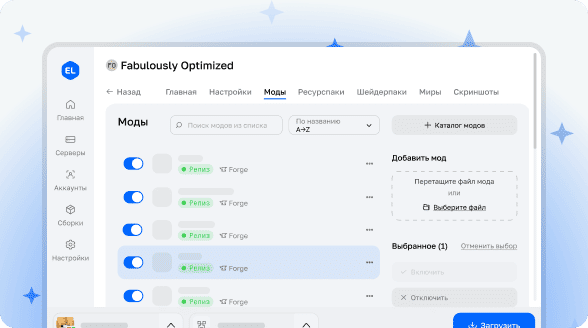
Player Roles for Fabric
Player Roles mod provides a flexible permission management system for Minecraft servers using Fabric. It allows assigning special roles to users with specific permissions, similar to Discord's role system.
Main Features
The system operates through a JSON configuration file located in the configuration directory (<root>/config/roles.json). This file can be edited and reloaded during server runtime, which is convenient for quick testing and configuration.
Configuration Example
{
"admin": {
"level": 100,
"overrides": {
"name_decoration": {
"style": ["red", "bold"],
"suffix": {"text": ""}
},
"permission_level": 4,
"command_feedback": true,
"commands": {
".": "allow"
}
}
},
"spectator": {
"level": 10,
"overrides": {
"commands": {
"gamemode (spectator|adventure)": "allow"
}
}
},
"mute": {
"level": 1,
"overrides": {
"mute": true
}
},
"everyone": {
"overrides": {
"commands": {
"help": "allow",
".*": "deny"
}
}
}
}This example defines four roles: admin, spectator, mute, and everyone. The everyone role is basic and automatically assigned to all players, it cannot be removed. Other roles act as additional settings on top of the basic role.
Override Types
Command Management
The commands setting allows controlling which commands players can use. You can set regular expressions for command matching and define processing strategies:
allow- permit command usagedeny- prohibit command usagehidden- allow command but hide it from suggestions
Name Decoration
Using name_decoration, you can modify how player names appear in chat and player list. Available parameters:
style- text style (color, bold, underline)prefix- text before the namesuffix- text after the namecontexts- where to apply decoration (chat, tab_list)
Chat Types
The chat_type setting allows replacing chat message decorations for specific roles. The system integrates with Minecraft's vanilla chat type registry.
Additional Features
permission_level- sets vanilla permission system levelmute- blocks ability to type in chatcommand_feedback- enables command execution notificationsentity_selectors- allows using entity selectors
Advanced Features
Roles can inherit settings from other roles through the includes parameter. You can also apply roles to command blocks and function executors.
In-Game Management
Use the /role command for role management:
/role assign <player> <role>- assign role/role remove <player> <role>- remove role/role list <player>- show player's roles/role reload- reload configuration
The system automatically resolves conflicts between roles by selecting settings from the role with the highest level.


